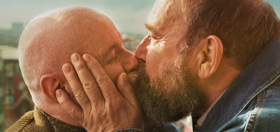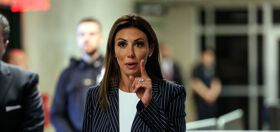
Don’t judge Senatorial hopeful John Chromczak by his Republican cover.
The first openly gay Republican to run for New York state Senate, Chromczak knows his odds are slim, especially considering he’s running for the 25th district, which includes lower Manhattan and part of Brooklyn.
Though he’s faced resistance from a variety of voters, he’s particularly perturbed by some gay voters, many of whom Chromczak says have become politically close-minded.
Discussing his participation the recent Wedding March here in New York City, Chromczak laments:
When I’ve gone to some of these things, I get shot down as soon as somebody hears that I’m a Republican. To me, it’s very discriminatory and goes against a lot of what people say.
I don’t understand why, if you’re a liberal progressive, you don’t want to have an open mind and sit down and have a legitimate conversation about a variety of issues without automatically balking because I’m a Republican. It made me very angry.
Those are the same feelings as being in gym class and somebody’s calling me a faggot – it’s the same thing when I’m walking across the Brooklyn Bridge and somebody’s berating me because I’m a Republican. How is that inclusive? How does that defeat bigotry and homophobia?
Before you yourselves balk, keep in mind that four New York state Republicans this year made serious headway with a queer inclusive anti-bullying bill.
Our editor recently sat down with Chromczak to discuss a variety of issues, like how the politico balances practicing Catholicism with his sexuality. Also, Chromczak tells voters how he intends on fixing the state’s economy, tells us why Senator Chuck Schumer’s a thorn in his side, informs us that we shouldn’t care about John McCain’s cancer, takes on the city’s left-wing gay paper and offers his thoughts on why he – a medical technician with little political experience aside from union membership – should be sent to Albany. All that and more, after the jump.
Andrew Belonsky: I’m sure you’re aware that Albany can be a difficult city to deal with, so what qualifies you to go up to Albany and make serious changes?
John Chromczak: A lot. I think not only my life experience, but also my strong desire to do something for the community I live in, Lower Manhattan. We need to stop sending back the same old career politicians who keep saying they’re going to do something and never do anything. This year everybody’s talking about change and being a little bit more open-minded, so I decided to put myself out there. I’m an average Joe, like everybody else – I wake up in the morning, I go to work, I go home at night, I worry about how I’m going to pay my bills and the increasing cost of just living in the city. Something needs to be done. Many of the people we have up there now are incapable of working together and doing something for New York.
AB: What steps, as a lawmaker, would you to rectify our state’s economic troubles? As you know, we have no money here.
JC: I think it’s just being honest about it. Listen, we’re probably going to have to cap the state budget – we’re going to have to say, “We’re only going to spend [x] amount of dollars.” We’re going to have to make some very severe cuts in New York State’s budget.
AB: What programs would you cut?
JC: First of all, we have to prioritize. What are going to be our top three priorities in the state? I think clearly education is going to be one of them. We need to not only increase funding for that, but we need to spend those dollars more wisely, especially in New York City. Number two – I don’t agree with a lot of people when it comes to health cost in New York State. We spend over $45 billion a year in New York – that’s more than California and Texas combined. I think we can make some cuts there. I think we can get more into waste and fraud, which is, by several measures, around $18 billion a year. That’s $18 billion that we could have been spending building schools in New York City, paying for more teachers to reduce class sizes. So, yes, there are things we could do in health care. And I say that as someone who has been working in the field for ten years.
AB: At NYU Medical.
JC: Yes. And I’m also a union member. I’m 1199 member. I’m one of those people who could potentially be affected by decreasing costs or fixing costs in health care. The third thing, specifically for New York City, is that we have to get the World Trade Center rebuilt and we have to get it done sooner, rather than later. It’s the single most important construction project in the United States. It’s going to keep us competitive with cities like Hong Kong, Dubai and London. All these cities are competing to be the financial capital of the world, meanwhile everybody’s sitting back in New York, saying, “Well, it’s going to be us forever.”
AB: But if our nation is in this current financial crisis, even if we do get the building erected in the next – let’s be optimistic: five years – who is going to go in there? How are we going to regain our financial center?
JC: We have to show the rest of the world, number one, that we can get that done; that it’s not going to take us 20 years to rebuild a 16-acre site, when you can go to Dubai, which is a beautiful, modern city that literally built itself out of desert in ten years.
AB: But does Dubai have the same workers’ rights as the United States?
JC: No, they don’t, but it’s part of being in a global market. I’m not saying that we want to turn into that, but we have to know how to compete with that, because there are a lot of countries around the world who are looking at their bottom line. Why spend $100 in New York City when we only have to spend $60 in London, or $70 in Hong Kong to have our company headquarters there?
AB: You grew up in Utica, New York, in what I gather was a religious family.
JC: I did.
AB: Was it very religious?
JC: Yes. We were Catholic.
AB: So, growing up, did you go to a church that talked trash about gay people? Was that a challenge for you?
JC: You know, I have to be honest with you – I’m a practicing Catholic, I went to a public grammar school and a Catholic high school and I never heard anything from the pulpit, but I did hear a lot about people making fun of me. I got beat up all the time, people said snide remarks – that had more of an impact on me. My own personal religious experience is that in a lot of ways – my Catholic faith gave me something to hold onto, something to grasp – and it still does today.
AB: Even knowing that the Vatican would not approve of you?
JC: There are a lot of things about Catholicism that I do agree with and I’m not going to throw the baby out with the bath water because of one or two isolated issues.

[Chromczak named his dog after the left-wing activist and entertainer Bono.]
AB: One of your main things for your platform is reforming education. Education within the sphere of gay rights is a very controversial subject. How would you tackle a situation in which some of your constituents were angry over having gay-themed curriculum? What is your stance on that subject?
JC: It’s going to be a very slow process. I think that’s a time when you show real leadership. When I’m elected as a state Senator, there are going to be times that I’m going to have to vote a certain way that the majority of people I represent are not going to agree with, but you have to look at the long-term picture. I firmly believe in gay marriage equality – besides all the usual stuff that we in the gay community talk about, I really feel that it’s going to save lives. It is important for schools to start going into that new territory so students – gay and straight – feel more comfortable with themselves and aren’t ashamed or embarrassed about their sexuality. If they feel like they have to muzzle it or hide it, that’s when they turn to drugs, that’s when they turn to a life of promiscuity – and I don’t need to tell anybody in the gay community how rampant those two problems are for us. These are life and death situations. Schools needs to be a little bit of a social worker, a little bit of a nurturer and allow that child to feel safe and comfortable.
AB: [Left-leaning New York weekly] Gay City News endorsed your opponent, Dan Squadron.
JC: Sure they did. Does that surprise you?
AB: Did you have any conversation with the editorial board before that?
JC: No.
AB: But they know you’re gay?
JC: Yeah. They know that I’m out there.
AB: So why do you think they picked Squadron over you?
JC: I think they’re blinded by what they think is their own reality. I mean, first of all, nothing in Dan Squadron’s history says that he is pro anything, other than pro Chuck Schumer. I recently walked with the gay marriage equality march and, let’s face it, this is New York City, and there are a lot of liberals out there. And, quite frankly, there is a lot of hate around the word “Republican.” I’m trying to educate people that I’m not the bogey man, that there are a lot of people in my party who want to reach across the aisle and work together on this issue, because for me it is a human rights issue. I didn’t see Dan Squadron there. I didn’t even see him send out a press release that says he does support the gay community on this. There are a lot of people in the gay community who absolutely love someone like Chuck Schumer or Bill Clinton or the rest of them who come in and introduce themselves and rally the gays, but then they go in and punch you in the face with the Defense of Marriage Act.
AB: As you know, the Assembly passed a gender inclusive non-discrimination bill earlier this year. The Senate’s seen as a pretty big obstacle for the passage. Would you pass an inclusive non-discrimination bill?
JC: Absolutely. And I think there are a lot of Republicans who supported that bill. If the Democrats do take control over the Senate, which, outside of this issue, I think is going to be a huge problem for the state, but I don’t think these girls are going to come to the fort. There are three members of the Democratic caucus right now who absolutely will not vote for gender equality or same-sex marriage, like Ruben Diaz up in the Bronx. That’s inclusiveness?
AB: I know you received $11,000 from the GOP. How is outside fundraising going?
JC: It’s good. I would say that within three and a half months, we’ve raised about $50,000. By the end of the campaign, I think we’ll raise about $60,000, and considering that this is my first race – and probably my only race – but I’ll still be pushing these issues out there.
AB: You don’t sound very confident. Do you think you’re going to win this?
JC: It’s tough. I do think I’m going to win this – and I’ll tell you why in a minute. But I think raising $60,000 in a heavily Democratic district, I’m pretty proud of, and I’m proud of my volunteers and the people who supported me. I don’t have Chuck Schumer to hold my hand and tell friends to have a $75,000 fundraiser. I’m doing this on my own. This is real grass roots here, people. It’s not part of the same system of “This is my protégé and I want to have a legacy here in New York State.”
AB: On another note, I know your father died of melanoma when you were a child. Two left-wing PACs recently put out an ad highlighting John McCain’s health problems. Are you worried about John McCain’s health?
JC: No.
AB: You don’t think that should be an issue? Do you think John McCain should be our next president?
JC: Absolutely.
AB: Why?
JC: I don’t think somebody, because they’ve had some kind of specific health condition, precludes them from serving the public.
AB: Shouldn’t people be concerned about his health?
JC: I don’t think so. I remember when Ronald Reagan was running, everybody was concerned about his health issues and his age.
AB: A lot of people also think his Alzheimer’s set in while still in office.
JC: Well, I know a lot of crazy politicians. Sometimes you have to wonder about the mental health qualifications of people here, too. But, no, I’m not concerned about it. Millions of people in the United States are cured of cancer every year and they live long, healthy lives. I don’t think that because of his age or his health condition – melanoma is a very treatable disease. When my father died of melanoma in 1970, the cure rate was about 4% and today it’s in the 90s.
AB: Do you think Palin was the right decision for McCain to make?
JC: I’m going to let the American people decide on that.


















Paul Raposo
“I don’t understand why, if you’re a liberal progressive, you don’t want to have an open mind and sit down and have a legitimate conversation about a variety of issues without automatically balking because I’m a Republican. It made me very angry.”
If Mr. Chromczak would like to see what trying to have an open minded conversation with a homocon is really like, I’d suggest he head over to the Gay Patriot blog and read some of Bruce’s postings and more importantly, the comments left by his gay conservative readers. “Very angry” best describes most right wing gays.
Better yet, read North Dallas Thirty’s blog; or American Elephant’s blog; or any of the other homocon blogs–including the now defunct homocon.com–and get a taste of what trying to debate a homocon brings one–emotional futility.
I apprecite Mr. Chromczak’s thin veneer of open mindedness. However the true personality of the homocon belies his calls for open mindedness–on the parts of others. When Mr. Chromczak asks his fellow homocons to stop molly-coddling anti-gay leaders in their chosen party, his opinion and that of others sharing his opinion will matter to the other 80% of LGBTQ Americans.
As far as praising Dubai, Mr. Chromczak, please take a vaction there and while there, try walking along the beach while holding your partner’s hand. Then return, if they let you, to America and tell us how brillaint Dubai is
Paul Raposo
BTW–Andrew, I don’t usually nit-pick your spelling, but in the States, it’s “boogie man”, not “bogey man”, which is the UK version of the legend. Unless Mr. Chromczak is telling us he is not Humphrey Bogart. This is an important interview, let’s keep it tight.
greybat
Rebuild the world trade center? Gods! I guess all the world loves a phallic symbol…
I wonder if John realizes that many republicans have earned the dislike bestowed upon them? That guilt by association is a powerful thing, not easy to shake off?
And does he really want to shake it off?
Justin Tyme
OK, I won’t judge him because he is a republican. I’ll judge him by the fact that he supports a party that, quite frankly, would rather see all of us dead. The republican stand for one thing–getting as much money into their own hands at the expense of everyone who is not inside the straight, male, white, christian, anglo “normative center”.
This guy is just a testament, like his Log Cabin brothers, that greed extends across all lines of sexual orientation.
CitizenGeek
Boo hoo! Do I need to remind Mr. Chromczak of all the nasty things Republicans do to gays? How can he just conveniently sideline all of that?
I hope and would pray (were I a believer) that greedy “gay Republicans” get everything they deserve (and this includes a colossal loss for this politician in his upcoming election). I know that sounds petty, but Republicans have proven again and again how much they utterly and completely hate gay people and it’s gone beyond the stage now where it’s acceptable or even reasonable to support gay rights AND the Republican party simultaneously.
Andrew Byrd
I hope that at least some people see the prejudice that John Chromczak faces being a gay republican, from both Republicans and also from a number of gays. I think it is unfair for us to automatically write him off as a illegitimate candidate when in fact he does wholeheartedly support marriage equality and other causes that would be beneficial to the gay community. Is it not unjust for African Americans to automatically write off a black candidate because he is a republican (i.e. what happened to Clarence Thomas in the early 90’s)? Why doesn’t the same logic apply here?
greybat
I don’t think anyone wrote off Clarence Thomas for being republican, as they did for his being a sexual predator and a hypocrite.
greybat
I don’t think anyone wrote off Clarence Thomas for being republican, as much as they did for his being a sexual predator and a hypocrite.
Bob R
Queerty, you have lost any and all control over your blog. It has been over run by right wing lunatics, and now there’s posting in Arabic that goes on and on about what? There has to be some moderation of responses or the comments section is just going to implode.
Darth Paul
Yeah, Bob R is right. Some douchebag AIPAC republican is obviously trolling hard here.
But…Chromczak is kinda cute. I wouldn’t vote for him, but I’d make him squeal.
M Shane
I agree about the lack of consideration shown to other readers by some twits, who can’t do more than childish pranks. Remove their posts if you can.
This Chromczak is just running the status quo right wing B.S about saving money by spending less on things kie health care. The only veneer I see is the malarkey related to “oh come listen to me. it’s not what you think ” and it is! the same old stinky republican economic crap.
I wouldn’t vote for him in a hundred years unless he changes his politics to something humane.
Chris
ok so what can we do to support his opponent? Better a straight liberal than a gay neo-con asshole.
blake
Andrew Bird,
This guy does not face “prejudice” from other gays! He’s a frickin’ Republican! He gets the same treatment that straight Republicans get! Disdain for how they have screwed up the country and engaged in decades of despicable behavior.
Gay or straight, Republicans are part of a party that is based on hate, hypocrisy, and greed. Republicans, gay or straight, largely, wrap themselves in the flag and spew hatred.
Paul mentioned some of the vile, hateful homocon conservatives, like North Dallas 30–a vicious racist, homophobe. Why should gay people be any accepting of a gay republican who aligns himself with people like Rush Limbaugh, Karl Rove, etc? Aren’t homocons the ones who always talk about “not voting” their “sexuality”?
Look at the evil gay Republican trolls on this site. Racist scum like Church-nazi, Men-sar, RCPV, etc. They are all out in force to spew racist hate. That’s the face of gay Republicans.
Queerty Editors,
As others have mentioned, you have allowed the comments section to be infiltrated by racists and Republican trolls. There’s a difference between intellectual discourse that can get harsh.
Instead, we have blatantly racist comments from posters like Churchill-y and others. Why is this?
greybat
Nicely put, Blake!
But do remember, not all trolls are republicans…a troll is a troll first and above all else.
Jim
Nothing is more egregious than a Republican whining about how “liberal progressives” are so close minded towards them. Being a liberal Democrat certainly does not mean that I need to be faux tolerant toward a political party and ideology I find repugnant. People choose to be Republicans. I am not going to trip over myself to be polite or “broad minded” about their asinine choices or political opinions.
On a second front, the New York State Senate Republicans have kept the anti-bullying bill bottled up for a decade and have never once let it come to a vote. So spare me the crap about making progress on it. If the Republican majority wanted it passed, it would presently be the law. That simple.
John LowerEastSider
Daniel Squadron, the democrat that Mr.Chromczak is running against is a great fighter for LGBT people.
Daniel Squadron believes in full equality for gay people and believes in protecting gay families. Openly gay NY State Senator Daniel J. O’Donnell has endorsed Daniel Squadron. Daniel Squadron has a gay brother he is very close with.
Brooklyn Bobby
Yea. John’s right. Plus Daniel Squadron was endorsed by the Gay City News.